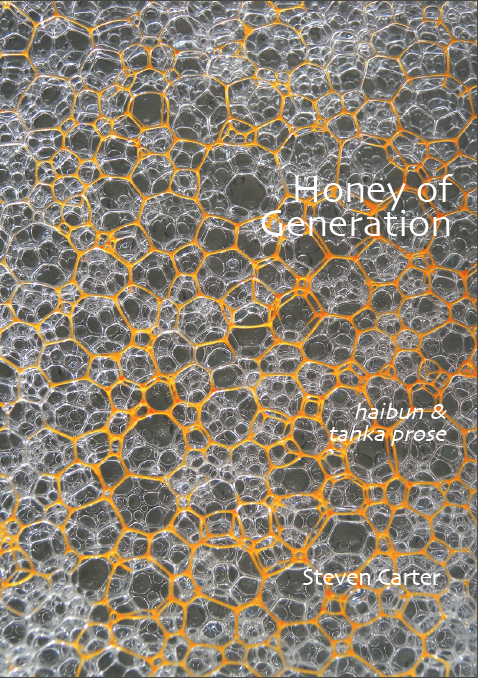Bob Lucky
Review of Steven Carter's Honey of Generation, Alba Publishing: Uxbridge, UK, 2017.
 Reading this new collection by Steven Carter, I'm reminded of the poet David Kirby, another writer who draws heavily on his academic background, literature, and has developed a style that juxtaposes it with popular culture references. Carter makes numerous references to authors, painters, historical events, and more across cultures and time – Dante and Agatha Christie, Klimt and 2001: A Space Odyssey, Coleridge, Mishima Yukio, the Punic Wars, Lewis and Clarke's journals, T.S. Eliot and Nietzsche. There are also allusions and unattributed quotes (sometimes in parodic ways) to or from the Bible, Elizabeth Barrett Browning and the oracular "Know thyself," to name a few. Sometimes it feels a bit like name-dropping. However, one thing is clear, it will take a well-read reader to fully appreciate some of these haibun. Reading this new collection by Steven Carter, I'm reminded of the poet David Kirby, another writer who draws heavily on his academic background, literature, and has developed a style that juxtaposes it with popular culture references. Carter makes numerous references to authors, painters, historical events, and more across cultures and time – Dante and Agatha Christie, Klimt and 2001: A Space Odyssey, Coleridge, Mishima Yukio, the Punic Wars, Lewis and Clarke's journals, T.S. Eliot and Nietzsche. There are also allusions and unattributed quotes (sometimes in parodic ways) to or from the Bible, Elizabeth Barrett Browning and the oracular "Know thyself," to name a few. Sometimes it feels a bit like name-dropping. However, one thing is clear, it will take a well-read reader to fully appreciate some of these haibun.
In several of the haibun, Carter seems to be talking to himself, answering his own questions. It's not really an internal monolog so much as, in tone at least, a man working something out. But in the middle of it all, it's as if he turns to address the reader, as in "11/23/2012." After a line lifted (as in no attribution and assuming that a well-read reader will recognize it) from Matthew Arnold's "Dover Beach" - And we are here as on a darkling plain – the next paragraph is "Guess what? I almost wrote 'darling'…". This can work, but the timing of the tonal shift has to be perfectly timed, as in "Opus 33." And here it coincides with the link and shift between the prose and the haiku. The haibun begins with a modified version of the opening verse of the Doors' "The End." The prose is a bit of a reverie around famous people buried in Père Lachaise cemetery and a beautiful day in Paris. In the last paragraph, the speaker is swirling the day moon in a glass of wine. The haibun ends with this one-line haiku:
polite waiter bit of a disappointment
This is pitch perfect, and funny to my ears. (Even though not much of a haiku, it works in this haibun.)
This book is well worth a read, several in fact, even if a few of the haibun probably wouldn't pass Ken Jones' "so what?" test. Carter writes well, and many of these haibun have beautiful descriptive passages and moments of poignancy.
|

